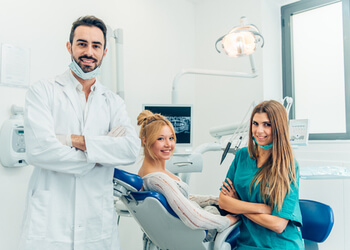Wondering what to do after tooth extraction? If you follow your Dental 266 dentist’s instructions, get enough rest and ensure your mouth is clean, you can recover relatively quickly. Tooth extractions are performed every day in our practice and we strive to ensure that all patients have a comfortable experience. Let’s take a closer look at what to expect from recovery and aftercare once you have had a tooth pulled.
What Happens During A Tooth Extraction?
Before your tooth can be extracted your dentist will numb the area by administering an anaesthetic injection. This is to ensure that you do not feel anything during the extraction. Once the injection has been administered you will wait a few minutes for it to take effect.
If you are having a wisdom tooth extraction and the tooth is impacted your dentist will need to remove any gum and bone that cover the tooth. An impacted wisdom tooth may first need to be loosened with forceps (this allows your dentist to get a firm grip on the tooth) in order to release it from the ligaments and bone around it. In some cases a tooth that is difficult to extract may need to be cut into smaller pieces.
Some teeth can be extracted in a few seconds, while others may require a bit more work from your dentist.
What Happens After The Tooth Extraction?
After your tooth has been pulled out, a blood clot must form in the empty socket in order to start the healing process. You will have an open wound in your mouth so your dentist will give you a piece of gauze to bite down on. The pressure from biting down will curb the bleeding.
It is very important that the blood clot stays in place, because if it comes out it causes a very painful condition called dry socket. Dry socket exposes your bone and nerves and can take a few days to heal.
 In order to prevent the onset of dry socket you should
In order to prevent the onset of dry socket you should
- Not play with or touch the site of your extraction with your tongue
- Avoid brushing, rinsing and gargling for the first 24-hours after your extraction
- Avoid very hot or very cold drinks or foods
- Avoid eating and drinking on the side of your mouth where the tooth was extracted
Speeding Up The Recovery Process After Tooth Extraction
Your dentist or oral hygienist will give you instructions to follow, to ensure a safe healing process. Here are some tips on how to manage recovery after tooth extraction.
Some degree of swelling and discomfort can be expected after your extraction, so take the painkillers and anti-inflammatory medication as recommended by your dentist if needed.
Change your gauze pad when necessary. You can expect to keep the gauze in your mouth for three to four hours after the surgery. A little bleeding in the day after the surgery is normal, but it shouldn’t get any worse. If the bleeding seems to increase or you experience severe pain after the anaesthetic has worn off, you should contact your dentist.
If you experience swelling, use an ice pack on that side of your face. Swelling is common after wisdom tooth extraction, but can be managed quite well with ice. Just remember not to exceed using the ice pack for more than 10 minutes at a time.
Get some rest. Allow yourself some downtime for at least 24 hours after your surgery. Your chances of recovery and healing are much greater when you are relaxed.
24-hours after the tooth extraction, you will be able to use a saline solution to rinse your mouth with, in order to keep it clean.
Do not smoke, especially for the first 24-hours. Smoking makes it difficult to keep your mouth clean and increases your chances of developing an infection.
It is important to eat soft foods to ensure you keep your energy levels up while you recover from a tooth extraction. On the day following your surgery, stick to food like soup, yoghurt and fruit.
After the first 24 hours you will be able to brush your teeth and tongue and floss as normal, but you should avoid the site of your extraction so you do not disturb the blood clot.
When You Should Contact Your Dentist
Any sign of infection or fever, nausea or vomiting after a tooth extraction should be reported immediately. Coughing, chest pain or tightness or excessive swelling or bleeding from the site should also be reported.
If you have any questions about tooth extraction or would like to speak to a professional please contact us for the most convenient appointment: (02) 9051 0600


 In order to prevent the onset of dry socket you should
In order to prevent the onset of dry socket you should



